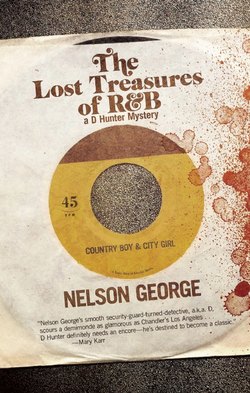Читать книгу The Lost Treasures of R&B - Nelson George - Страница 9
На сайте Литреса книга снята с продажи.
ОглавлениеINNER CITY BLUES
D was riding the C train across Brooklyn, an experience that brought him back to his childhood in Brownsville and reminded him how many of his friends had gone wrong. For them it hadn’t been about food, shelter, and clothing, it had been about diamonds, brands, and ghetto-fab. They wanted to be envied. They wanted to be sweated and jocked and talked about. Green-tinted paper was the ticket. So D resented money because it had played him and everyone else he knew for a fool. But how else did Americans keep score?
When D was a kid he thought a lot about this on the subway whenever it got crowded. He’d look at all the people around him, crushed against each other, breathing into each other’s faces, trying not to look into each other’s eyes. What the fuck was this all about? Money, of course. And judging by all the Bibles, Watchtowers, and Korans D saw people hunched over and moving their mouths to read, religion was a damn good business.
It was about fucking too. There were babies everywhere, usually pushed by young girls who seemed either too ill-tempered or casual in their caregiving duties.
D had been one of those crying subway babies. His mother had one of those too-loud, high-pitched black girl voices that cut through the rumble of steel wheels. He had been the fourth of four boys. The murders of his three older brothers had beaten his mother down. His father? Long gone. She’d remade her life and was living down South with her devout new husband, seeking spiritual salvation in the rituals of domesticity she’d been denied as a younger woman.
A gang of black and white people got off the C train at Nostrand but D kept standing. When he was thirteen the C train was his domain. He and his boys would roll on it after school to vic niggas, scare old men, and hover over smaller kids, standing right on top of them until they damn near volunteered their train pass. For that whole silly summer of thirteen, D felt he owned this subway—the iron horse was his personal ride, and he could decide if those around him rode in fear or comfort.
D had escaped incarceration by sheer dumb luck and the influence of a cop named Tyrone “Fly Ty” Williams, the patron saint of the Hunter family who’d recently retired from the NYPD (and was now chillin’ somewhere outside ATL). Like a lot of kids who’d mugged people as a teenager, D never saw himself as a criminal or thug or predator, justifying everything he’d done as an adventure. If he’d grown up in a place with fast cars and open roads, D would have been racing near cliffs on precarious curves.
At thirteen he’d wanted a thrill and robbing people had been that. Despite his size, D was never solely the muscle. He’d been a tactician. A strategist. He pointed people out, whistled that a mark was coming. He had kicked people and scared people and enjoyed the chase. These days D was all about security, keeping people safe and being a paragon of some loose virtue. He stayed as clean as hand towels, yet was always vaguely worried his bad adolescent deeds would somehow catch up with him.
D’s move back to Brooklyn was triggering many unwelcome memories. But the “new” Brooklyn of today pulled him back to now. Where had all these white people come from? He remembered when they all got off at the Lafayette stop. Then some went one stop farther to Clinton-Washington. Now they went to Nostrand and sometimes all the way out to Ralph. That lots of white people, mostly in their twenties and often dressed corny, rode this far into Bed-Stuy bugged him out. Word was these new white folks had already staked claim to Bushwick, and were edging into the border of the rugged, distant ghetto hoods of Brownsville and East New York.
D was even more shocked by the goatee-growing, Converse sneaker–wearing, tight jean and peacoat–sporting black folks these hipster types rolled with. He’d dealt with more than his share of bourgie, suit-and-tie fly Negroes in his day and way too many bureaucratic Queens home-owning black people staring at him across desks at clinics, Social Security offices, and police precincts. None of them seemed that different from D except they had a nine-to-five and he didn’t.
But these new black folks were from a planet D hadn’t visited. So when one of these kinky-haired, peacoat-wearing dudes approached him, D didn’t know what to think. In another era this guy would have been a mark, someone he and his crew of thirteen-year-olds would have smacked and jacked. The dude reached into his pocket, pulled out a flyer, and said, “You look like a music head. If you have any vinyl to sell, come through.” D nodded and took the flyer as the kid and his white buddy exited the C train at Ralph. The flyer read, VINYL DUNGEON. Bushwick.
D surveyed it, stuffed it in his pocket, then shook his head.
